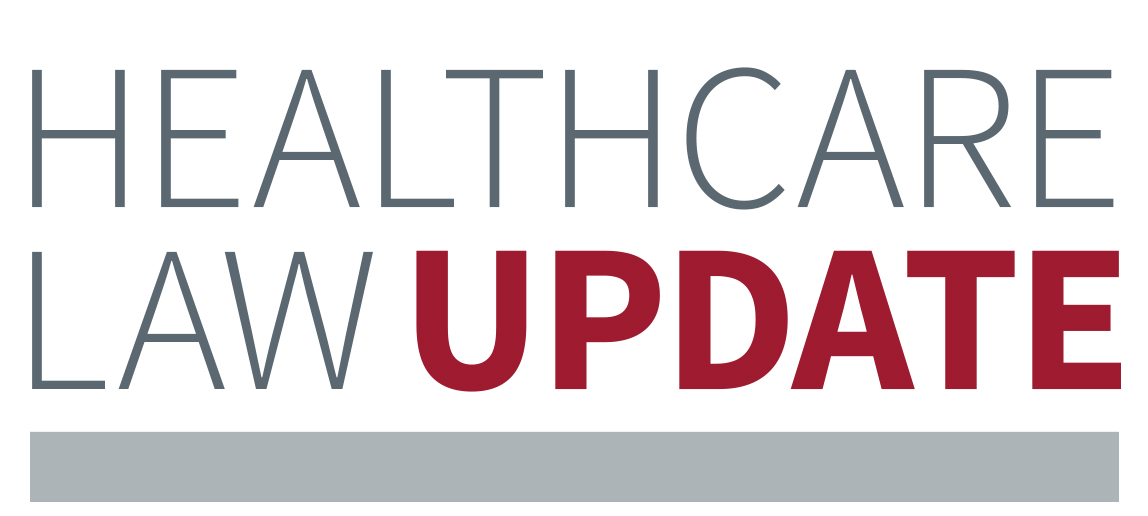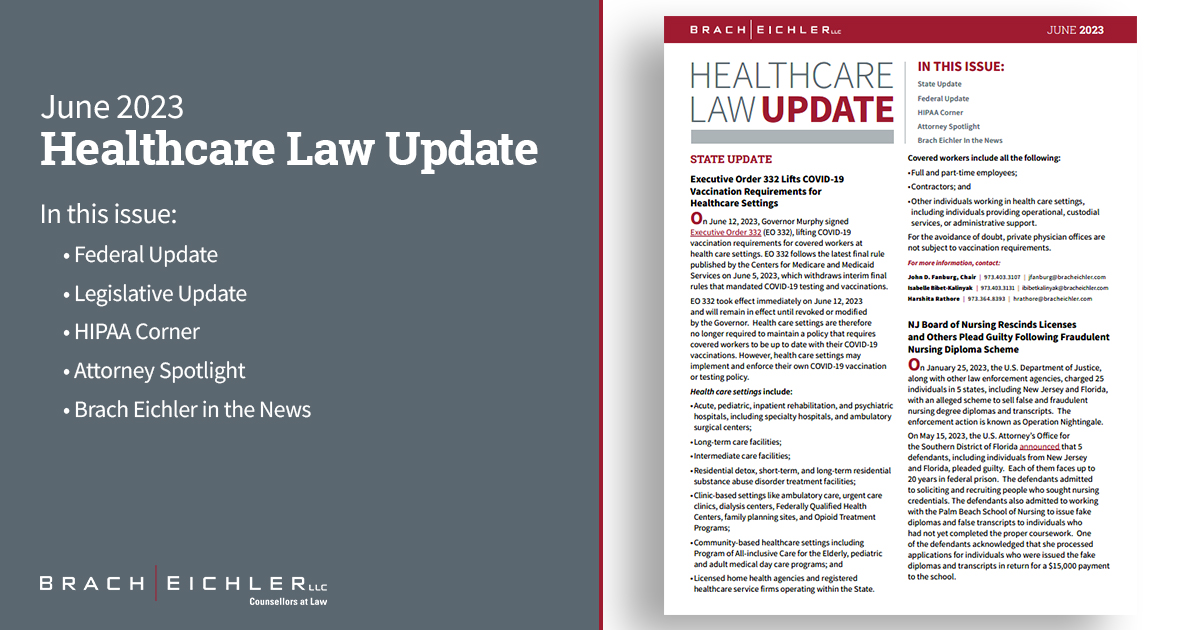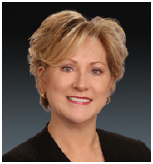

On June 12, 2023, Governor Murphy signed Executive Order 332 (EO 332), lifting COVID-19 vaccination requirements for covered workers at health care settings. EO 332 follows the latest final rule published by the Centers for Medicare and Medicaid Services on June 5, 2023, which withdraws interim final rules that mandated COVID-19 testing and vaccinations.
EO 332 took effect immediately on June 12, 2023 and will remain in effect until revoked or modified by the Governor. Health care settings are therefore no longer required to maintain a policy that requires covered workers to be up to date with their COVID-19 vaccinations. However, health care settings may implement and enforce their own COVID-19 vaccination or testing policy.
• Acute, pediatric, inpatient rehabilitation, and psychiatric hospitals, including specialty hospitals, and ambulatory surgical centers;
• Long-term care facilities;
• Intermediate care facilities;
• Residential detox, short-term, and long-term residential substance abuse disorder treatment facilities;
• Clinic-based settings like ambulatory care, urgent care clinics, dialysis centers, Federally Qualified Health Centers, family planning sites, and Opioid Treatment Programs;
• Community-based healthcare settings including Program of All-inclusive Care for the Elderly, pediatric
• Full and part-time employees;
• Contractors; and
• Other individuals working in health care settings, including individuals providing operational, custodial services, or administrative support.
For more information, contact:
John D. Fanburg, Chair | 973.403.3107 | jfanburg@bracheichler.com
Isabelle Bibet-Kalinyak | 973.403.3131 | ibibetkalinyak@bracheichler.com
Harshita Rathore | 973.364.8393 | hrathore@bracheichler.com
On January 25, 2023, the U.S. Department of Justice, along with other law enforcement agencies, charged 25 individuals in 5 states, including New Jersey and Florida, with an alleged scheme to sell false and fraudulent nursing degree diplomas and transcripts. The enforcement action is known as Operation Nightingale.
On May 15, 2023, the U.S. Attorney’s Office for the Southern District of Florida announced that 5 defendants, including individuals from New Jersey and Florida, pleaded guilty. Each of them faces up to 20 years in federal prison. The defendants admitted to soliciting and recruiting people who sought nursing credentials. The defendants also admitted to working with the Palm Beach School of Nursing to issue fake diplomas and false transcripts to individuals who had not yet completed the proper coursework. One of the defendants acknowledged that she processed applications for individuals who were issued the fake diplomas and transcripts in return for a $15,000 payment to the school.
Following the U.S. Department of Justice’s investigation, on March 9, 2023, the New Jersey Attorney General Matthew Platkin announced that 20 nurses had their licenses rescinded. Additionally, 26 other individuals who had received temporary licenses issued by the New Jersey Division of Consumer Affairs, Board of Nursing, under the Temporary Emergency Reciprocity Licensure Program had their temporary licenses voided and their pending applications for full licensure denied.
For more information, contact:
Joseph M. Gorrell | 973.403.3112 | jgorrell@bracheichler.com
Edward J. Yun | 973.364.5229 | eyun@bracheichler.com
Sally Olson | 973.403.3102 | solson@bracheichler.com

On May 3, 3023, New York State enacted a new law that requires health care entities to provide written notice and supporting documentation to the State Department of Health (DOH) at least 30 days before closing certain significant transactions. However, the new law does not require the DOH’s approval for these transactions. The new law will become effective as of August 1, 2023. Failure to comply with the notification requirement can lead to civil penalties ranging from $2,000 to $10,000 per day of noncompliance.
The new law applies to “material transactions” involving health care entities such as physician practices, management services organizations or similar entities providing administrative or management services under contract with physician practices, provider-sponsored organizations, health insurance plans or any other kind of health care facility, organization or plan providing health care services in New York. The new law does not apply to transactions involving insurers and pharmacy benefit managers. The new law defines “material transaction” to include mergers, acquisitions, affiliations, and the formation of partnerships or management organizations
related to health care administration.
The written notice required under the new law must contain specific information, including the names and addresses of the parties involved, copies of relevant agreements, details of current service locations and revenue, plans for service reductions or network participation, closing dates, and a description of the transaction’s impact on cost, quality, access, health equity, and competition. There are certain exceptions to the notice requirement, including clinical affiliations formed for collaborating on clinical trials or graduate medical programs, “de minimis” transactions resulting in an increase of less than $25 million in total gross in-state revenues for a health care entity, and transactions already subject to review under specific articles of the New York Public Health Law.
For more information, contact:
John D. Fanburg, Chair | 973.403.3107 | jfanburg@bracheichler.com
Jonathan J. Walzman | 973.403.3120 | jwalzman@bracheichler.com
Harshita Rathore | 973.364.8393 | hrathore@bracheichler.com
The Centers for Medicare & Medicaid Services (CMS) has proposed extensive changes to the Medicaid Drug Rebate Program. The changes primarily focus on drug misclassification, drug pricing, and product data misreporting by pharmaceutical manufacturers. Program integrity and administration changes affecting manufacturers would include limitations on the timeframe for manufacturers to initiate audits of state Medicaid plan drug rebate obligations, clarification on accumulating price concessions, and the establishment of drug price verification and transparency through data collection. CMS is aiming to enhance transparency in prescription drug costs by verifying reported prices through an annual Medicaid Drug Price Verification Survey. This transparency initiative and the disclosure of non-proprietary drug price information are intended to give state Medicaid agencies greater negotiating power with drug manufacturers, particularly for high-cost drugs.
For more information, contact:
Carol Grelecki | 973.403.3140 | cgrelecki@bracheichler.com
Caroline J. Patterson | 973.403.3141 | cpatterson@bracheichler.com
Vanessa Coleman | 973.364.5208 | vcoleman@bracheichler.com
The United States Department of Justice issued a press release on June 1, 2023 announcing that a Colorado physician has been sentenced to two and a half years in prison for fraudulently obtaining and misappropriating approximately $250,000 from COVID-19 relief programs. The physician was the supervisory physician at a medical clinic with three offices in Colorado. From March through June 2020 the physician applied for and received government funds for COVID-19 relief from the Accelerated and Advance Payment Program and the Paycheck Protection Program. Both programs were designed to provide emergency financial assistance to medical providers and small businesses impacted by the COVID-19 pandemic. Instead of utilizing the funds for their intended purposes, the physician diverted the money to cover his own personal expenses.
For more information, contact:
Riza I. Dagli | 973.403.3103 | rdagli@bracheichler.com
Caroline J. Patterson | 973.403.3141 | cpatterson@bracheichler.com
Vanessa Coleman | 973.364.5208 | vcoleman@bracheichler.com
The Centers for Medicare & Medicaid Services recently adopted an updated Advance Beneficiary Notice of Noncoverage (ABN) Form, Form CMS-R-131. Providers, including independent laboratories, home health agencies, skilled nursing facilities, hospices, physicians, practitioners, and suppliers to Medicare fee for service beneficiaries, typically issue this Form to patients in situations where Medicare payment is expected to be denied. The Form serves as a means to transfer potential financial liability to the Medicare beneficiary in certain instances. The Form must be provided to a patient prior to the commencement of services, and if the patient chooses to proceed with the service and signs the Form, the Provider may bill the patient if Medicare does not cover the cost of the service.
For more information, contact:
Isabelle Bibet-Kalinyak | 973.403.3131 | ibibetkalinyak@bracheichler.com
Jonathan J. Walzman | 973.403.3120 | jwalzman@bracheichler.com
Harshita Rathore | 973.364.8393 | hrathore@bracheichler.com

In March 2023, the U.S. Department of Health and Human Services Office of Inspector General (OIG) published a frequently asked questions page (the FAQ) that, among other things, provides new guidance on how the OIG will evaluate a physician’s ownership of an Ambulatory Surgery Center (ASC) where the physician-owner is unable to satisfy the one-third income test under the ASC safe harbor to the Federal Anti-Kickback Statute (AKS).
Generally, if a physician-owner receives a return on his/her investment in an ASC, such remuneration implicates the AKS. In many cases, the physician is able to satisfy all of the requirements of the ASC safe harbor so that such remuneration does not result in a violation of the AKS. However, in some cases, a physician-owner may be unable to satisfy the requirement that at least one-third of his/her medical practice income from all sources for the previous fiscal year or previous 12-month period be derived from performing ASC procedures (the Practice Income Test). Significantly, failure to satisfy all of the requirements of the ASC safe harbor does not automatically result in a violation of the AKS. Rather, in that event, the arrangement is subject to greater scrutiny by the OIG.
In the FAQ, the OIG indicated that, where the Practice Income Test is the only requirement that is not satisfied under the ASC safe harbor, the OIG would evaluate theASC arrangement based on a “totality of the facts and circumstances of the specific arrangement.”
This includes the following:
(i) whether the physician-owner will refer patients to the ASC for procedures that he/she will not personally perform;
(ii) whether the physician-owner will make use of the ASC for his/her own procedures; and
(iii) what circumstances cause the physician-owner to fail the Practice Income Test (e.g., he/she performs a high volume of inpatient procedures).
The OIG’s new guidance will assist physicians and ASCs in determining whether an arrangement that does not satisfy the Practice Income Test requirement under the ASC safe harbor poses risk under the AKS.
For more information, contact:
Carol Grelecki | 973.403.3140 | cgrelecki@bracheichler.com
Edward J. Yun | 973.364.5229 | eyun@bracheichler.com
Cynthia J. Liba | 973.403.3106 | cliba@bracheichler.com
On June 1, 2023, in a unanimous decision, the United States Supreme Court found in U.S. ex. rel. Schutte v. SuperValu Inc. that liability under the False Claims Act (FCA) turns on a defendant’s subjective belief that the claims they submit are false, and is not determined based on an objective reasonableness standard of knowledge. The FCA targets fraud related to government contracts and the submission of claims for payment from the government. The FCA imposes liability on defendants who knowingly submit false or fraudulent claims for government payment, and defines “knowingly” as acting with actual knowledge, deliberate ignorance, or reckless disregard. In its ruling, the Supreme Court overturned two Seventh Circuit decisions that held that a defendant’s subjective beliefs are irrelevant in FCA cases if the defendant’s conduct represented an objectively reasonable interpretation of the relevant issue.
The cases involved pharmacies that were accused by whistleblowers of overcharging Medicare, Medicaid, and the Federal Employee Health Benefits Program for prescription drugs. The whistleblowers alleged that the pharmacies overbilled the government by offering discounted prices to customers but not adjusting their “usual and customary” prices in the claims they submitted for reimbursement, which should
reflect the price the provider actually charged for the pharmaceuticals. The Seventh Circuit ruled in favor of the pharmacies, applying an objectively reasonable standard in determining whether a provider knowingly submitted false claims. The Supreme Court rejected the Seventh Circuit’s reasoning, finding that a defendant meets the FCA’s intent requirement if the defendant’s subjective beliefs indicate it had knowledge that its submission of claims was false, regardless of whether the defendant’s conduct could be supported by a later objectively reasonable interpretation of the law. The Court also found that the “knowingly” standard under the FCA may be satisfied by proof of actual knowledge, deliberate ignorance or reckless disregard of the truth or falsity of the claim.
For more information, contact:
Keith J. Roberts | 973.364.5201 | kroberts@bracheichler.com
Jonathan J. Walzman | 973.403.3120 | cjwalzman@bracheichler.com
Harshita Rathore | 973.364.8393 | hrathore@bracheichler.com

Assembly Bill 5489, introduced in the New Jersey General Assembly on May 18, 2023, would require any hospital conducting a urine drug screening to assist in diagnosing a patient’s condition to also include a test for the presence of certain synthetic opioids. Currently, urine drug screenings typically include tests for cocaine, certain opioids, and phencyclidine, but not additional synthetic opioids. Mandatory testing for the presence of certain synthetic opioids could help prevent overdose deaths by ensuring that patients who have ingested certain synthetic opioids, either intentionally or unintentionally, receive proper treatment for a synthetic opioid overdose.

Bill Introduced to Establish Maternal and Infant Health Innovation Center Act
Assembly Bill 5472, introduced in the New Jersey General Assembly on May 18, 2023, would establish the New Jersey Maternal and Infant Health Innovation Center Act. The Bill would create the New Jersey Maternal and Infant Health Innovation Authority (the Authority) and would transfer the primary authority for coordinating all efforts and strategies to reduce maternal mortality, morbidity, and racial and ethnic disparities in the State from the New Jersey Maternal Care Quality Collaborative to the Authority. The Bill would appropriate $23,220,000 from the General Fund to the Authority to cover its operational, administrative, and other expenses.
State and Federal Updates on Restrictive Covenants
Assembly Bill A2003, introduced in the New Jersey General Assembly on January 11, 2022, was reviewed by the Assembly Health Committee on June 5, 2023. The Bill, if enacted, would render void and unenforceable any contract or agreement that limits a licensed physician’s right to practice medicine in a specific geographic area after the termination of a partnership, employment, or professional relationship, with limited exceptions.
At the federal level, on May 30, 2023, the National Labor Relations Board Office of the General Counsel declared that noncompete agreements generally violate federal labor law. Earlier this year, the Federal Trade Commission (FTC) proposed a broad ban on all noncompete agreements with only one narrow exception for agreements made in connection with the sale of a business. Public comment on the proposed FTC rule closed on April 19, 2023.
For more information, contact:
John D. Fanburg, Chair | 973.403.3107 | jfanburg@bracheichler.com
Edward Hilzenrath | 973.403.3114 | ehilzenrath@bracheichler.com
Vanessa Coleman | 973.364.5208 | vcoleman@bracheichler.com
On June 15, 2023, the U.S. Department of Health and Human Services, Office for Civil Rights (OCR) announced a $240,000 settlement with a hospital based upon the OCR’s findings that hospital security guards used their official log-in credentials to access and “snoop” into medical records of 419 patients who visited the hospital’s emergency department without a job-related purpose. In addition to the settlement payment, the resolution agreement entered into between the hospital and the OCR required the organization to implement a corrective action plan to bring the organization into HIPAA compliance and two years of OCR monitoring.
The settlement should serve as a reminder to health care providers of the need to have in place a robust and active HIPAA compliance program that includes routine monitoring of employee activity in electronic medical record systems and employee discipline for non-compliance.
Use Care in Responding to Online Reviews
On June 5, 2023, the U.S. Department of Health and Human Services, Office for Civil Rights (OCR) issued a press release announcing its settlement with a psychiatric health center relating to allegations the center impermissibly disclosed patient information in response to online negative reviews, as well as its failure to implement policies and procedures with respect to protected health information.
“OCR continues to receive complaints about health care providers disclosing their patients’ protected health information on social media or on the internet in response to negative reviews. Simply put, this is not allowed,” said OCR Director Melanie Fontes Rainer. “The HIPAA Privacy Rule expressly protects patients from this type of activity, which is a clear violation of both patient trust and the law. OCR will investigate and take action when we learn of such impermissible disclosures, no matter how large or small the organization.”
In settlement of the OCR’s allegations, the OCR and the center entered into a resolution agreement requiring payment of $30,000, implementation of a corrective action plan, and two years of OCR monitoring.
If you need assistance with your HIPAA compliance program, an OCR investigation, or a data breach incident, please contact:
Lani M. Dornfeld, CHPC | 973.403.3136 | ldornfeld@bracheichler.com
Get to know the faces and stories of the people behind the articles in each issue. This month, we invite you to meet Partner Lani M. Dornfeld and Associate Cynthia Liba.
What do you consider when you are faced with a client who might need your services?
I try to spend some time in becoming familiar with each client and the client’s business or personal needs, so I can take that into consideration when providing legal services. Whenever possible, I work toward a result that not only provides the needed legal service but also gets as close as possible to meeting the client’s business or personal goals. At times, this requires thinking outside the box or finding a creative solution.
What are some best practices for healthcare clients?
My practice includes both regulatory compliance and health care business transaction services. With the continuation of private equity in health care and a marketplace that is still strong in purchases and sales of health care businesses, joint ventures and other combined arrangements, my advice for best practices is to place a strong emphasis on regulatory compliance initiatives. If a health care business does not have its house in order, including up-to-date and active compliance programs and dedicated compliance staff, these transactions become more difficult and the ultimate sale price is often decreased or indemnification escrows increased, or both, as a result of identified compliance issues.
What advice can you share with a client who might need your services?
Do not hesitate to ask for clarification regarding any provision of a contract that may seem confusing. Legalese is often convoluted.
What are some best practices for healthcare clients?
Healthcare laws and regulations are constantly evolving. Therefore, it is necessary to continuously monitor policies and other compliance procedures to ensure they are up to date.

The following Brach Eichler Healthcare Law Members were named 2023 New Jersey Super Lawyers: Lani M. Dornfeld, John D. Fanburg, Joseph M. Gorrell, Carol Grelecki, and Keith J. Roberts. Shannon Carroll and Emily Harris were each named a NJ Rising Star. Congratulations to all!
On June 14, Healthcare Law Members John D. Fanburg, Isabelle Bibet-Kalinyak, and Edward Hilzenrath issued a Healthcare Law Alert entitled “Executive Order 332 Lifts COVID-19 Vaccination Requirements For Healthcare Settings.”
On June 14, Managing Member and Healthcare Law Chair John D. Fanburg presented at NJAASC Quarterly Meeting. John provided a legislative and regulatory update.
On June 7, Brach Eichler’s Healthcare Law Practice was once again recognized among New Jersey’s top healthcare law practices, ranked in top tier (Band 1) by Chambers & Partners 2023 USA Guide. Additionally, Chambers USA also recognized the following individual Healthcare members of the Firm: John D. Fanburg, with the highest Band 1 recognition in NJ; Joseph Gorrell, Senior Statespeople, and Carol Grelecki, Band 3.
On May 25, Managing Member John D. Fanburg welcomed litigation partners Edward D. Altabet and Andrew Macklin, along with litigation associate Susan Schulman in The New Jersey Law Journal.
Join us for the 12th Annual New Jersey Healthcare Market Review, September 28-29, 2023 at the Borgata Hotel Casino & Spa, Atlantic City, NJ! Connect with over 200 attendees comprised of hospital and ASC executives and stakeholders, physicians, practice owners/managers, and healthcare administrators. During this two-day event, industry experts will discuss timely topics and trends in the healthcare and legal space ranging from legislative issues to operating and business strategies for greater profitability. To learn more and register, please visit www.njhmr.com. For questions or additional information, please reach out to Ilana Schackman at ischackman@bracheichler.com.

Attorney Advertising: This publication is designed to provide Brach Eichler LLC clients and
contacts with information they can use to more effectively manage their businesses. The contents
of this publication are for informational purposes only. Neither this publication nor the lawyers who
authored it are rendering legal or other professional advice or opinions on specific facts or matters.
Brach Eichler LLC assumes no liability in connection with the use of this publication.

Shannon Carroll | 973.403.3126 | scarroll@bracheichler.com
Riza I. Dagli | 973.403.3103 | rdagli@bracheichler.com
Lani M. Dornfeld | 973.403.3136 | ldornfeld@bracheichler.com
John D. Fanburg, Chair | 973.403.3107 | jfanburg@bracheichler.com
Joseph M. Gorrell | 973.403.3112 | jgorrell@bracheichler.com
Carol Grelecki | 973.403.3140 | cgrelecki@bracheichler.com
Caroline J. Patterson | 973.403.3141 | cpatterson@bracheichler.com
Keith J. Roberts | 973.364.5201 | kroberts@bracheichler.com
Richard B. Robins | 973.447.9663 | rrobins@bracheichler.com
Jonathan J. Walzman | 973.403.3120 | jwalzman@bracheichler.com
Edward J. Yun | 973.364.5229 | eyun@bracheichler.com
Paul J. DeMartino, Jr. | 973.364.5228 | pdemartino@bracheichler.com
Emily J. Harris | 973.364.5205 | eharris@bracheichler.com
Cynthia J. Liba | 973.403.3106 | cliba@bracheichler.com
Sally Olson | 973.403.3102 | solson@bracheichler.com
Harshita Rathore | 973.364.8393 | hrathore@bracheichler.com
Roseland, NJ | New York, NY | West Palm Beach, FL | www.bracheichler.com | 973.228.5700





